Unit 2 Great minds Grammar 课件(23张ppt)
文档属性
| 名称 | Unit 2 Great minds Grammar 课件(23张ppt) | 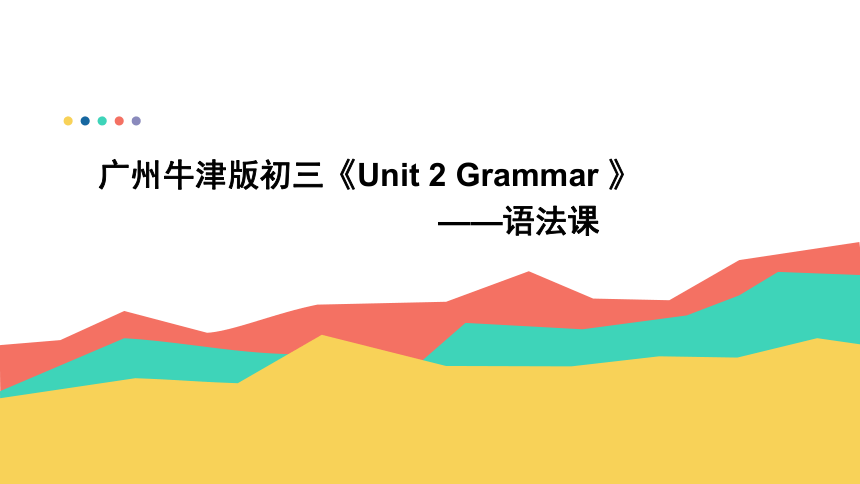 | |
| 格式 | pptx | ||
| 文件大小 | 792.1KB | ||
| 资源类型 | 教案 | ||
| 版本资源 | 牛津深圳版 | ||
| 科目 | 英语 | ||
| 更新时间 | 2021-09-17 15:54:26 | ||
图片预览

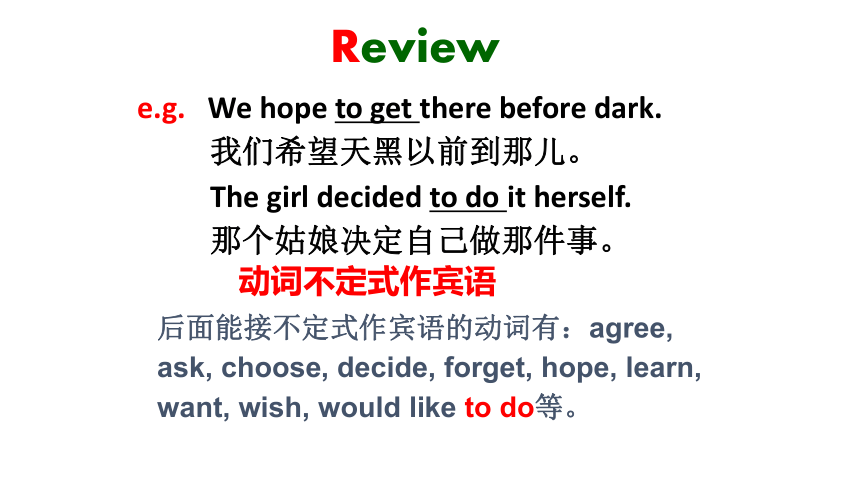
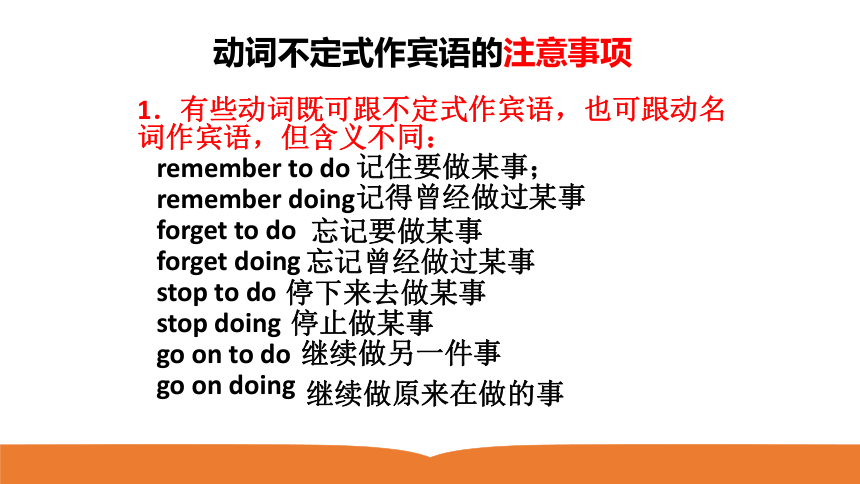

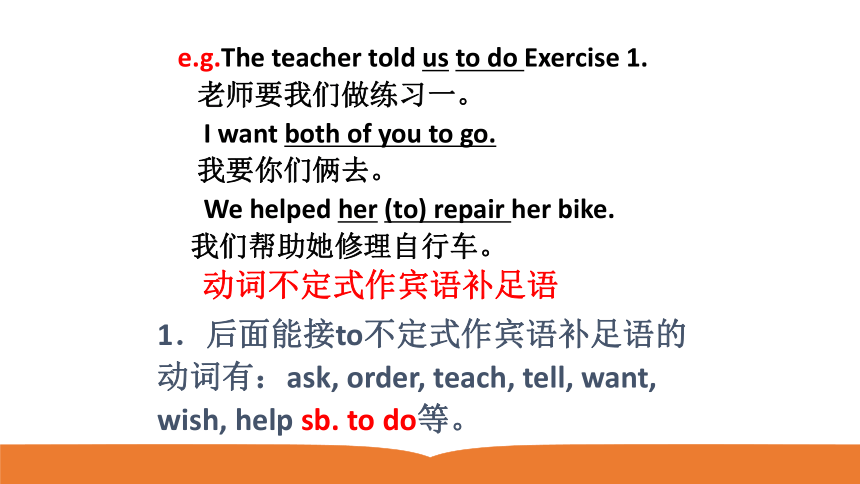
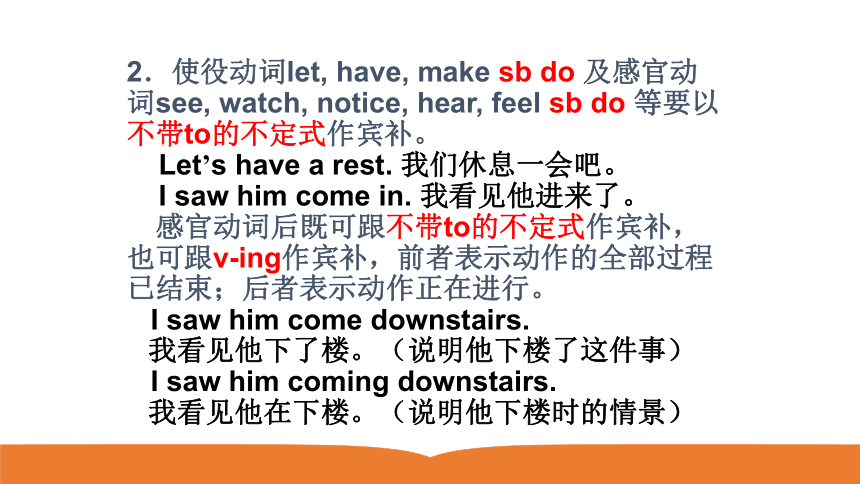

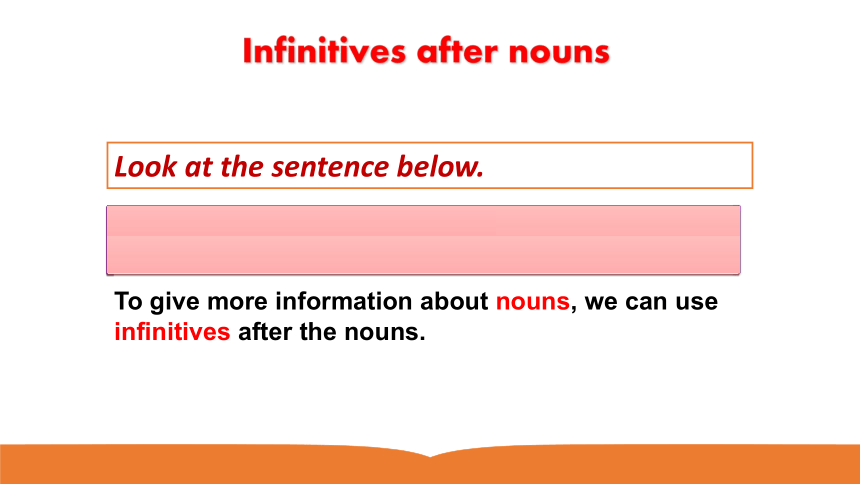
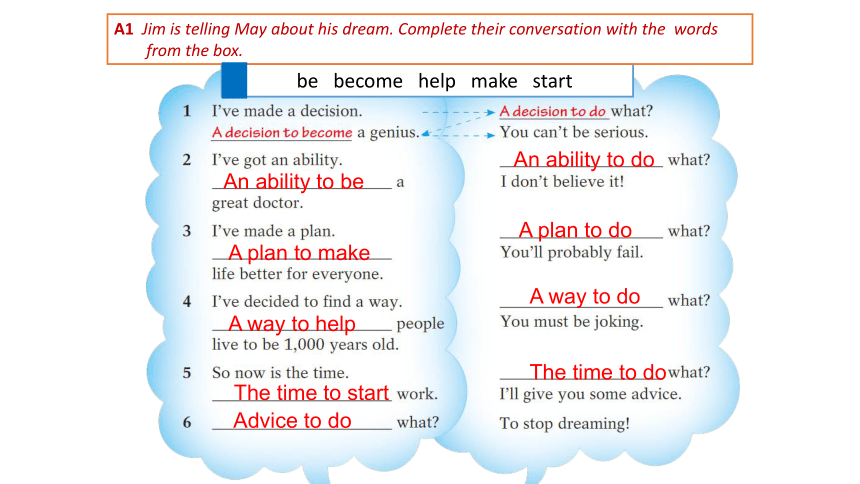
文档简介
(共23张PPT)
广州牛津版初三《Unit
2
Grammar
》
——语法课
Review
e.g.
We
hope
to
get
there
before
dark.
我们希望天黑以前到那儿。
The
girl
decided
to
do
it
herself.
那个姑娘决定自己做那件事。
动词不定式作宾语
后面能接不定式作宾语的动词有:agree,
ask,
choose,
decide,
forget,
hope,
learn,
want,
wish,
would
like
to
do等。
动词不定式作宾语的注意事项
1.有些动词既可跟不定式作宾语,也可跟动名词作宾语,但含义不同:
remember
to
do
remember
doing
forget
to
do
forget
doing
stop
to
do
stop
doing
go
on
to
do
go
on
doing
记住要做某事;
记得曾经做过某事
忘记要做某事
忘记曾经做过某事
停下来去做某事
停止做某事
继续做另一件事
继续做原来在做的事
2.不定式作宾语时,如带有宾语补足语,则要把不定式放到后面,用it作形式宾语,构成“主语+动词+it+宾补(形容词、名词)+不定式”结构。如:
He
found
it
very
difficult
to
get
to
sleep.
他发现很难入睡。
e.g.The
teacher
told
us
to
do
Exercise
1.
老师要我们做练习一。
I
want
both
of
you
to
go.
我要你们俩去。
We
helped
her
(to)
repair
her
bike.
我们帮助她修理自行车。
动词不定式作宾语补足语
1.后面能接to不定式作宾语补足语的动词有:ask,
order,
teach,
tell,
want,
wish,
help
sb.
to
do等。
2.使役动词let,
have,
make
sb
do
及感官动词see,
watch,
notice,
hear,
feel
sb
do
等要以不带to的不定式作宾补。
Let’s
have
a
rest.
我们休息一会吧。
I
saw
him
come
in.
我看见他进来了。
感官动词后既可跟不带to的不定式作宾补,也可跟v-ing作宾补,前者表示动作的全部过程已结束;后者表示动作正在进行。
I
saw
him
come
downstairs.
我看见他下了楼。(说明他下楼了这件事)
I
saw
him
coming
downstairs.
我看见他在下楼。(说明他下楼时的情景)
e.g.He
ran
fast
to
catch
the
first
bus.
He
came
here
only
to
say
goodbye
to
us.
动词不定式作目的状语
Infinitives
after
nouns
Einstein
often
received
invitations
to
explain
his
theories
at
different
universities.
To
give
more
information
about
nouns,
we
can
use
infinitives
after
the
nouns.
Look
at
the
sentence
below.
be
become
help
make
start
A1
Jim
is
telling
May
about
his
dream.
Complete
their
conversation
with
the
words
from
the
box.
An
ability
to
do
A
plan
to
do
An
ability
to
be
A
plan
to
make
A
way
to
do
A
way
to
help
The
time
to
do
The
time
to
start
Advice
to
do
Make
conversations
with
the
nouns
from
the
box.
Use
infinitives
after
the
nouns
in
your
conversations.
You
may
follow
the
example
below.
A2
Complete
the
paragraph
below
with
the
words
from
the
box.
At
school,
Einstein’s
ability
(1)_________________
surprised
his
teachers,
but
he
was
bored
with
other
subjects.
At
the
age
of
15,
he
was
given
the
chance
(2)_______________________,
but
he
did
not
do
well
enough
in
the
exam.
He
did
not
lose
heart,
however,
and
he
had
a
wish
(3)_______________________
the
next
year.
This
time,
he
succeeded.
He
kept
trying,
so
he
achieved
his
dream
(4)_______________________.
become
a
scientist
go
to
university
do
Maths
try
again
to
do
Maths
to
go
to
university
to
try
again
to
become
a
scientist
Rewrite
the
sentences
with
the
words
in
brackets.
Do
not
change
the
meaning
of
each
sentence.
He
decided
to
leave
school.
(decision)
He
made
a
decision
to
leave
school.
He
is
able
to
do
it.
(ability)
He
has
the
ability
to
do
it.
I
plan
to
visit
Paris
next
year.
(plan)
I
make
a
plan
to
visit
Paris
next
year.
To
drive
a
genius
like
you
is
a
pleasure,
Dr
Einstein.
To
have
a
friend
like
Einstein
was
good.
To
answer
the
question
was
easy
for
Einstein.
Infinitives
as
subjects
It’s
a
pleasure
to
drive
a
genius
like
you,
Dr
Einstein.
It
was
good
to
have
a
friend
like
Einstein.
It
was
easy
for
Einstein
to
answer
the
question.
In
most
cases,
we
use
it
at
the
beginning
of
the
sentence
as
an
empty
subject
to
refer
to
the
infinitive.
It
is
+
adj+
of
/
for
sb
to
do
sth句型详解
区别:adj.说人的用
of
sb.
adj.说事的用
for
sb
e.g.对他来说学两门外语是很难的。
It's
very
hard
for
him
to
study
two
languages.
你来帮助我,你真是太好了。
It's
very
nice
of
you
to
help
me.?
1.
It
was
stupid
____
me
to
talk
in
that
way
to
my
mother.
2.
It
is
very
important
___
us
to
master
English.
3.
It
was
impossible
____the
little
boy
to
carry
such
a
heavy
box.
4.
It
is
smart______
them
to
make
good
use
of
the
Internet.
Exercise
of
for
for
of
It
takes/took+(
sb.)
+
time+
to
do
sth.
Hans
once
drove
another
scientist,
Dr
Green,
from
the
airport
to
a
university.
Complete
their
conversation
with
infinitives
and
words
in
brackets.
Dr
Green:
Hello,
Hans.
Hans:
Hello,
Dr
Green.
How
long
did
it
take
you
to
get
here
by
plane?
Dr
Green:
(1)_______________________________________.
(take/two
hours)
How
long
will
it
take
to
get
to
the
university?
Hans:
(2)_______________________________________.
(take/20
minutes)
It
took
me
two
hours
to
get
here
by
plane
It’ll
take
20
minutes
to
get
there/get
to
the
university
Dr
Green:
Well,
that’s
not
very
long.
Hans,
you’re
a
very
good
driver.
Is
it
difficult
to
drive
a
car?
Hans:
No.
(3)____________________________.(easy/drive)
Dr
Green:
Maybe
I’ll
learn
to
drive
some
day,
but
(4)________________________________________
(difficult/for
me/learn)
right
now.
I’m
too
busy.
Do
you
like
your
job,
Hans?
Hans:
Yes,
I
like
it
a
lot.
I
meet
many
great
people
because
I’m
a
driver.
(5)______________________________.
(lucky/for
me/have/job)
It’s
easy
to
drive
a
car
it’s
difficult
for
me
to
learn
to
drive
It’s
lucky
for
me
to
have
this
job
Sarah
is
an
advertisement
designer.
She
is
designing
some
slogans
for
Compex
computers.
Below
are
five
slogans
she
has
thought
of.
Rewrite
the
slogans
with
infinitives
as
subjects.
It
is
absolutely
fascinating
to
explore
the
world
of
Compex.
Buy
a
Compex
computer.
It
is
not
expensive.
It
is
not
expensive
to
buy
a
Compex
computer.
Using
the
computer
is
very
simple.
It
is
very
simple
to
use
the
computer.
Understanding
the
handbook
is
not
difficult.
It
is
not
difficult
to
understand
the
handbook.
You
can
run
any
kind
of
software.
It
is
easy.
It’
is
easy
(for
you)
to
run
any
kind
of
software.
Exploring
the
world
of
Compex
is
absolutely
fascinating.
My
dream
is
to
be
an
engineer.
My
wish
is
to
be
like
Einstein.
Jane’s
dream
is
to
become
a
scientist.
Infinitives
after
the
verb
to
be
We
also
use
infinitives
after
the
verb
to
be.
1
do
the
work/the
most
important
thing/well
________________________________________
2
in
a
year/Mr
White’s
plan/have
a
small
shop
________________________________________
3
attract
the
students/my
idea/by
making
a
poster
________________________________________
4
children/her
job/take
care
of
________________________________________
Put
the
words
in
the
correct
order
to
make
sentences.
Add
other
words
if
necessary.
The
most
important
thing
is
to
do
the
work
well.
Mr
White’s
plan
is
to
have
a
small
shop
in
a
year.
My
idea
is
to
attract
the
students
by
making
a
poster.
Her
job
is
to
take
care
of
children.
动词不定式作表语的一些用法:
主语为aim,dream,hope,idea,plan,purpose,
suggestion,wish等表示目的、计划或打算的词。如:
His
wish/dream
is
to
become
an
astronaut.
当句子的主语为work,job或function时,往往也使用这一结构。
如:The
man’s
job
was
to
give
advice
to
the
king.
The
function
of
an
adjective
is
to
describe
or
add
to
the
meaning
of
a
noun.
THANKS
广州牛津版初三《Unit
2
Grammar
》
——语法课
Review
e.g.
We
hope
to
get
there
before
dark.
我们希望天黑以前到那儿。
The
girl
decided
to
do
it
herself.
那个姑娘决定自己做那件事。
动词不定式作宾语
后面能接不定式作宾语的动词有:agree,
ask,
choose,
decide,
forget,
hope,
learn,
want,
wish,
would
like
to
do等。
动词不定式作宾语的注意事项
1.有些动词既可跟不定式作宾语,也可跟动名词作宾语,但含义不同:
remember
to
do
remember
doing
forget
to
do
forget
doing
stop
to
do
stop
doing
go
on
to
do
go
on
doing
记住要做某事;
记得曾经做过某事
忘记要做某事
忘记曾经做过某事
停下来去做某事
停止做某事
继续做另一件事
继续做原来在做的事
2.不定式作宾语时,如带有宾语补足语,则要把不定式放到后面,用it作形式宾语,构成“主语+动词+it+宾补(形容词、名词)+不定式”结构。如:
He
found
it
very
difficult
to
get
to
sleep.
他发现很难入睡。
e.g.The
teacher
told
us
to
do
Exercise
1.
老师要我们做练习一。
I
want
both
of
you
to
go.
我要你们俩去。
We
helped
her
(to)
repair
her
bike.
我们帮助她修理自行车。
动词不定式作宾语补足语
1.后面能接to不定式作宾语补足语的动词有:ask,
order,
teach,
tell,
want,
wish,
help
sb.
to
do等。
2.使役动词let,
have,
make
sb
do
及感官动词see,
watch,
notice,
hear,
feel
sb
do
等要以不带to的不定式作宾补。
Let’s
have
a
rest.
我们休息一会吧。
I
saw
him
come
in.
我看见他进来了。
感官动词后既可跟不带to的不定式作宾补,也可跟v-ing作宾补,前者表示动作的全部过程已结束;后者表示动作正在进行。
I
saw
him
come
downstairs.
我看见他下了楼。(说明他下楼了这件事)
I
saw
him
coming
downstairs.
我看见他在下楼。(说明他下楼时的情景)
e.g.He
ran
fast
to
catch
the
first
bus.
He
came
here
only
to
say
goodbye
to
us.
动词不定式作目的状语
Infinitives
after
nouns
Einstein
often
received
invitations
to
explain
his
theories
at
different
universities.
To
give
more
information
about
nouns,
we
can
use
infinitives
after
the
nouns.
Look
at
the
sentence
below.
be
become
help
make
start
A1
Jim
is
telling
May
about
his
dream.
Complete
their
conversation
with
the
words
from
the
box.
An
ability
to
do
A
plan
to
do
An
ability
to
be
A
plan
to
make
A
way
to
do
A
way
to
help
The
time
to
do
The
time
to
start
Advice
to
do
Make
conversations
with
the
nouns
from
the
box.
Use
infinitives
after
the
nouns
in
your
conversations.
You
may
follow
the
example
below.
A2
Complete
the
paragraph
below
with
the
words
from
the
box.
At
school,
Einstein’s
ability
(1)_________________
surprised
his
teachers,
but
he
was
bored
with
other
subjects.
At
the
age
of
15,
he
was
given
the
chance
(2)_______________________,
but
he
did
not
do
well
enough
in
the
exam.
He
did
not
lose
heart,
however,
and
he
had
a
wish
(3)_______________________
the
next
year.
This
time,
he
succeeded.
He
kept
trying,
so
he
achieved
his
dream
(4)_______________________.
become
a
scientist
go
to
university
do
Maths
try
again
to
do
Maths
to
go
to
university
to
try
again
to
become
a
scientist
Rewrite
the
sentences
with
the
words
in
brackets.
Do
not
change
the
meaning
of
each
sentence.
He
decided
to
leave
school.
(decision)
He
made
a
decision
to
leave
school.
He
is
able
to
do
it.
(ability)
He
has
the
ability
to
do
it.
I
plan
to
visit
Paris
next
year.
(plan)
I
make
a
plan
to
visit
Paris
next
year.
To
drive
a
genius
like
you
is
a
pleasure,
Dr
Einstein.
To
have
a
friend
like
Einstein
was
good.
To
answer
the
question
was
easy
for
Einstein.
Infinitives
as
subjects
It’s
a
pleasure
to
drive
a
genius
like
you,
Dr
Einstein.
It
was
good
to
have
a
friend
like
Einstein.
It
was
easy
for
Einstein
to
answer
the
question.
In
most
cases,
we
use
it
at
the
beginning
of
the
sentence
as
an
empty
subject
to
refer
to
the
infinitive.
It
is
+
adj+
of
/
for
sb
to
do
sth句型详解
区别:adj.说人的用
of
sb.
adj.说事的用
for
sb
e.g.对他来说学两门外语是很难的。
It's
very
hard
for
him
to
study
two
languages.
你来帮助我,你真是太好了。
It's
very
nice
of
you
to
help
me.?
1.
It
was
stupid
____
me
to
talk
in
that
way
to
my
mother.
2.
It
is
very
important
___
us
to
master
English.
3.
It
was
impossible
____the
little
boy
to
carry
such
a
heavy
box.
4.
It
is
smart______
them
to
make
good
use
of
the
Internet.
Exercise
of
for
for
of
It
takes/took+(
sb.)
+
time+
to
do
sth.
Hans
once
drove
another
scientist,
Dr
Green,
from
the
airport
to
a
university.
Complete
their
conversation
with
infinitives
and
words
in
brackets.
Dr
Green:
Hello,
Hans.
Hans:
Hello,
Dr
Green.
How
long
did
it
take
you
to
get
here
by
plane?
Dr
Green:
(1)_______________________________________.
(take/two
hours)
How
long
will
it
take
to
get
to
the
university?
Hans:
(2)_______________________________________.
(take/20
minutes)
It
took
me
two
hours
to
get
here
by
plane
It’ll
take
20
minutes
to
get
there/get
to
the
university
Dr
Green:
Well,
that’s
not
very
long.
Hans,
you’re
a
very
good
driver.
Is
it
difficult
to
drive
a
car?
Hans:
No.
(3)____________________________.(easy/drive)
Dr
Green:
Maybe
I’ll
learn
to
drive
some
day,
but
(4)________________________________________
(difficult/for
me/learn)
right
now.
I’m
too
busy.
Do
you
like
your
job,
Hans?
Hans:
Yes,
I
like
it
a
lot.
I
meet
many
great
people
because
I’m
a
driver.
(5)______________________________.
(lucky/for
me/have/job)
It’s
easy
to
drive
a
car
it’s
difficult
for
me
to
learn
to
drive
It’s
lucky
for
me
to
have
this
job
Sarah
is
an
advertisement
designer.
She
is
designing
some
slogans
for
Compex
computers.
Below
are
five
slogans
she
has
thought
of.
Rewrite
the
slogans
with
infinitives
as
subjects.
It
is
absolutely
fascinating
to
explore
the
world
of
Compex.
Buy
a
Compex
computer.
It
is
not
expensive.
It
is
not
expensive
to
buy
a
Compex
computer.
Using
the
computer
is
very
simple.
It
is
very
simple
to
use
the
computer.
Understanding
the
handbook
is
not
difficult.
It
is
not
difficult
to
understand
the
handbook.
You
can
run
any
kind
of
software.
It
is
easy.
It’
is
easy
(for
you)
to
run
any
kind
of
software.
Exploring
the
world
of
Compex
is
absolutely
fascinating.
My
dream
is
to
be
an
engineer.
My
wish
is
to
be
like
Einstein.
Jane’s
dream
is
to
become
a
scientist.
Infinitives
after
the
verb
to
be
We
also
use
infinitives
after
the
verb
to
be.
1
do
the
work/the
most
important
thing/well
________________________________________
2
in
a
year/Mr
White’s
plan/have
a
small
shop
________________________________________
3
attract
the
students/my
idea/by
making
a
poster
________________________________________
4
children/her
job/take
care
of
________________________________________
Put
the
words
in
the
correct
order
to
make
sentences.
Add
other
words
if
necessary.
The
most
important
thing
is
to
do
the
work
well.
Mr
White’s
plan
is
to
have
a
small
shop
in
a
year.
My
idea
is
to
attract
the
students
by
making
a
poster.
Her
job
is
to
take
care
of
children.
动词不定式作表语的一些用法:
主语为aim,dream,hope,idea,plan,purpose,
suggestion,wish等表示目的、计划或打算的词。如:
His
wish/dream
is
to
become
an
astronaut.
当句子的主语为work,job或function时,往往也使用这一结构。
如:The
man’s
job
was
to
give
advice
to
the
king.
The
function
of
an
adjective
is
to
describe
or
add
to
the
meaning
of
a
noun.
THANKS
